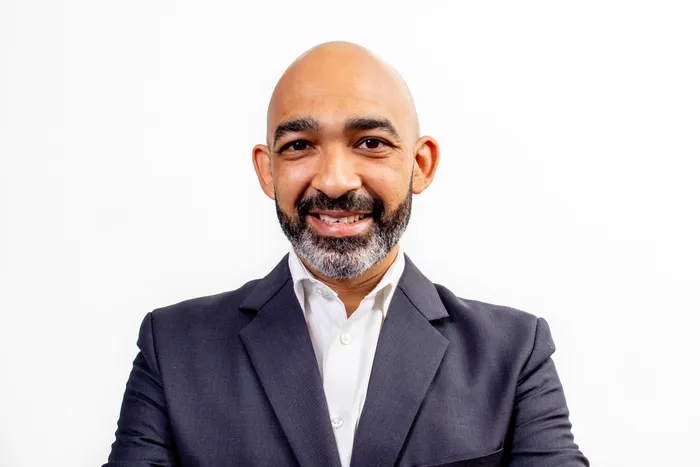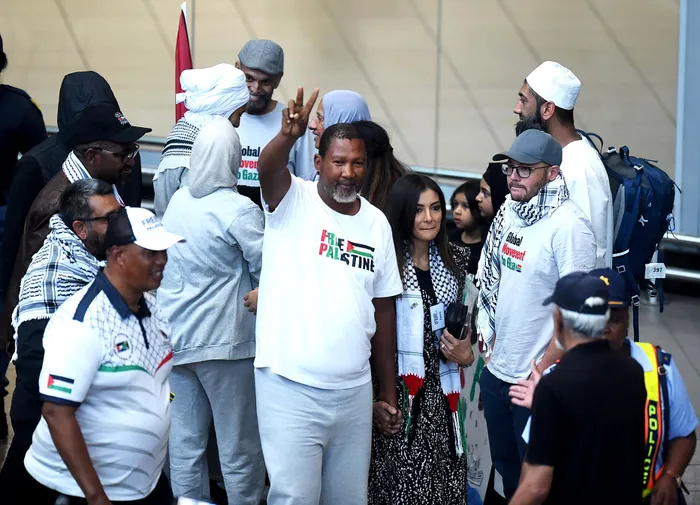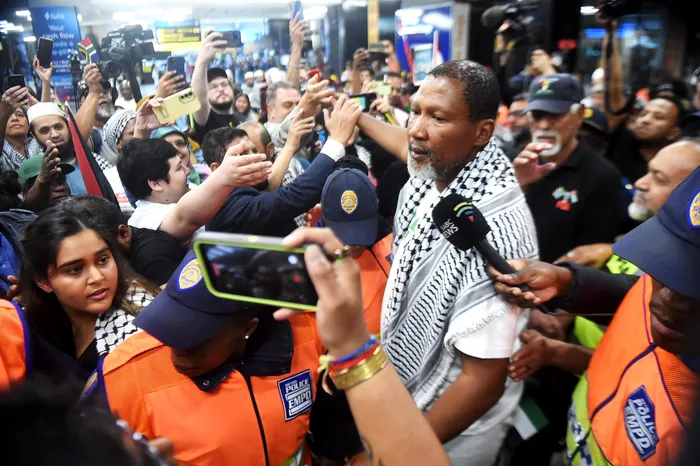
Prof Armand Bam is Head of Social Impact at Stellenbosch Business School
Image: Supplied

The return of Mandla Mandela and fellow activists from the Gaza-bound flotilla has become more than a political flashpoint — it’s a metaphor for South Africa’s eroding sovereignty.
Image: Itumeleng English/ Independent Newspapers

Mandla Mandela’s flotilla return reminds South Africa that sovereignty isn’t about borders, it’s about the courage to serve people, not power.
Image: Itumeleng English/ Independent Newspapers
When Mandla Mandela stepped off that plane, tired, handcuffed, still defiant, the cameras flashed like we’d just won a World Cup. But what exactly were we celebrating? That he survived detention? That our government got him back? That we still remember what moral courage looks like? It’s wild, isn’t it?
A humanitarian flotilla sails into international waters with food and medicine, and comes back with bruises and body-cam footage of humiliation. And somehow, the world barely blinks. Maybe because these days, outrage has a shorter lifespan than a TikTok trend.
But make no mistake: their return isn’t just a homecoming, it’s a mirror. It reflects how sovereignty has become a muscle some nations flex and others neglect.
Israel called the interception “protection.” Sure. But protecting what? Security or ego? Sovereignty, in its ugliest form, is just fear dressed up in a flag. It’s what happens when you mistake domination for safety. And here’s the kicker, that same fear lives here too. It’s in our municipalities that hoard power like toddlers guarding toys. It’s in leaders who fear accountability more than poverty. It’s in the unspoken national motto: “Eish, at least it’s not my problem,” and the hush that follows every scandal.
Power gets paranoid when it stops serving people. It starts seeing every question as rebellion. And that’s when things fall apart: at sea, in courtrooms, in the streets of small towns nobody visits unless there’s an election.
You might be missing it, because it’s not a fancy trend. General Nhlanhla Mkhwanazi told a commission that South Africa’s criminal justice system is “under attack”. Not metaphorically - literally. Interference, sabotage, intimidation. That’s not a headline; that’s a cry for help. Sovereignty isn’t only stolen by foreign powers; it’s drained by insiders pulling wires out of the walls. You can have borders, an anthem, even a constitution, but if your police, your courts, your towns are collapsing, you’re a country on paper, not in practice.
We talk about “protecting our sovereignty” like it’s a mystical force field. But you don’t lose sovereignty when a ship crosses your waters. You lose it when garbage piles up in your streets and no one in city hall answers the phone.
The flotilla was stopped at sea. But here, our people are intercepted every day by red tape, by potholes, by load-shedding, by leaders who’ve forgotten what leadership is.
Go to any failing municipality - pick one, there’s a lucky draw of dysfunction - and you’ll see what a silent siege looks like. The water’s off, the clinic’s closed, the tender’s missing, and the mayor’s explaining “context”. This is sovereignty under siege from apathy, greed, and a national attention span that runs out halfway through every scandal. It’s like watching a slow-motion shipwreck from the shore, and still debating whether to swim.
Real leadership isn’t command, it’s courage. It’s humility. It’s the ability to be corrected without needing a marching band to announce it.
But the flotilla flipped the script. The “led” became the moral leaders. They went out into the world, stood up for humanity, and came back bruised, but credible. Meanwhile, most political leaders watched the news like it was happening on another planet.
That’s the inversion: the citizens lead, and the leaders follow… slowly, nervously, checking who’s watching. And when those citizens come back, leadership has a choice: listen and change, or host a press conference and move on.Guess which one’s cheaper?
We’ve developed a dangerous national reflex: normalisation. We normalise broken taps, flickering lights, and promises that never arrive. We normalise leaders who appear only when cameras do.It’s like we’ve been hypnotised into thinking dysfunction is culture. It’s not. It’s learned helplessness. And the only thing worse than corruption is when people stop expecting anything better.
The flotilla return should jolt us. It’s proof that courage still exists, but it shouldn’t only appear when someone gets arrested abroad. We need courage here: in council chambers, in classrooms, in how we talk about accountability without calling it “politics”.
- If sovereignty means protection, who protects the people from their protectors?
- If leadership means service, why does it so often feel like surveillance?
- If patriotism means silence, then what’s treason - truth?
We love to talk about sovereignty as if it’s something you guard with guns. But what about the sovereignty of justice? Of clean water? Of trust?
Those are the frontiers we’ve already lost quietly, in committee meetings and budget adjustments.
There’s still time to fix it, but not much. The flotilla’s return is our parable. It shows what conviction looks like under pressure.
And the municipalities? They’re our test. If we can’t keep a streetlight on, we’ll never keep a nation standing.
Sovereignty doesn’t live in speeches. It lives in sewers that work, in judges who don’t flinch, in the police who can’t be bought, and in leaders who remember that humility is not a weakness; it’s a superpower.
The real border isn’t at the sea, it’s between courage and complacency. One side builds nations; the other builds excuses.
We don’t need more talks and campaigning. We need new nerve.
Because sovereignty isn’t something you defend with weapons; it’s something you defend with decency.
And right now, our ship’s taking on water.But we can still bail it out - if we stop arguing about whose bucket is prettier.
Prof Armand Bam is Head of Social Impact at Stellenbosch Business School